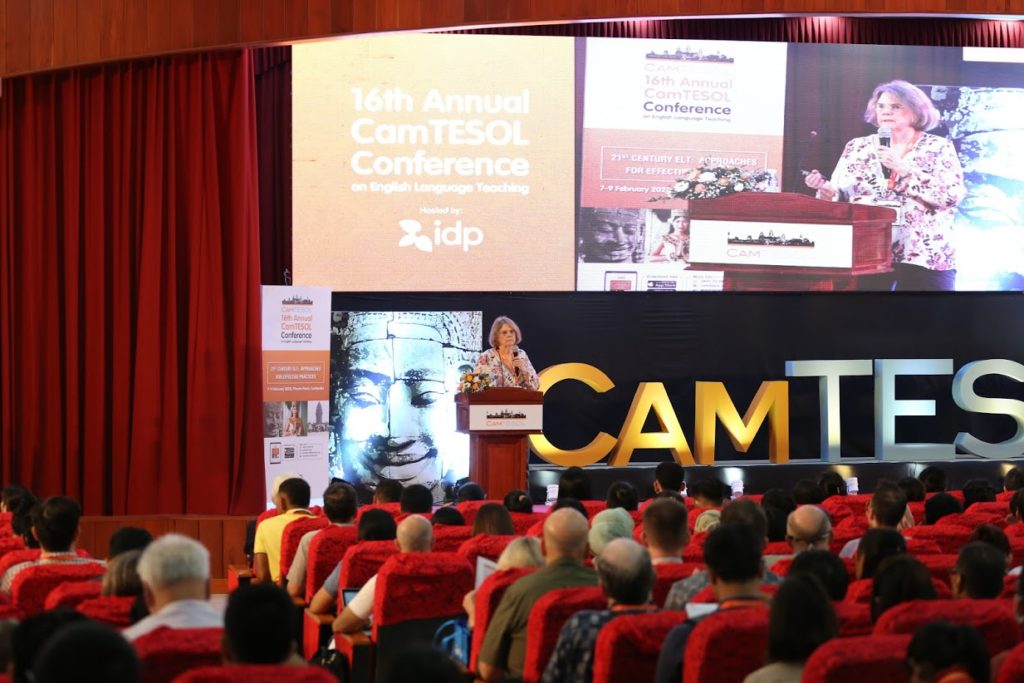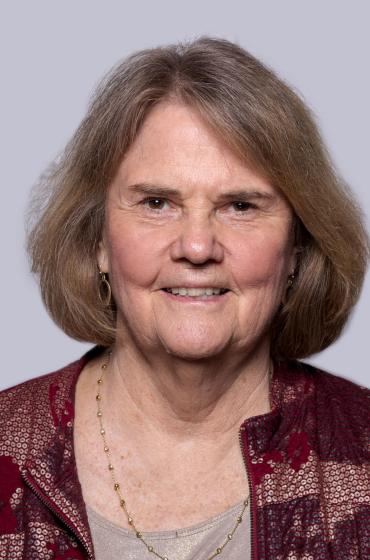“The opportunity to connect with so many people in so many places has been a gift.”
Among Dr. Diane Larsen-Freeman’s most cherished English Language Specialist memories are what she calls “TESOL moments,” those unanticipated events that take place abroad as a result of being part of the worldwide TESOL community. Her numerous Specialist assignments notwithstanding — conferences attended, speeches presented, classes observed, trainings led, and more — Larsen-Freeman finds particular joy in those strong connections forged when least expected. In Karakalpakstan, Uzbekistan, for example, while she waited in the frigid early morning hours for a long-delayed plane, Larsen-Freeman’s colleagues, concerned for their guest’s well-being, wrapped her in one blanket after another. In Argentina, her reluctant agreement to participate in an Embassy-arranged tango lesson turned into a delightful afternoon for Larsen-Freeman who, with her Argentinian dance partner, “did more laughing than dancing,” with a similar outcome in Honduras, dancing the punta with conference participants while trying to maintain her dignity. And in Nepal, when unable to make the final ascent to see the sun rise over the Himalayas during a pre-dawn group climb, a local boy approached her and wordlessly led her over a fence, through a field, and to a rocky ledge where the breathtaking view brought Larsen-Freeman to tears. “The opportunity to connect with so many people in so many places has been a gift,” she says, and these connections get renewed at annual TESOL Conventions, when she has joyful reunions with international visitors from places she has been.

Indeed, a common thread runs from these varied incidents to the linguistic message Larsen-Freeman has spent her career promoting — connection. “I am a subscriber of relational thinking, both interpersonally and conceptually. Language and culture, teaching and learning, grammar and communication — we need to find what connects these aspects of language,” she reflects. That last pairing, grammar and communication, and curricula that bridge the gap between the two, has long been a central teaching cause of Larsen-Freeman’s, culminating in her 2003 book Teaching Language: From Grammar to Grammaring. “Grammar had always been taught as a set of morphosyntactic rules,” she notes. “I said, no, grammar is much more than that. We’re leaving out an important dimension — when and why to use it.” The -ing attached to the word says it all: “I coined the term grammaring to show its dynamic, meaning-making, communicative potential.”
“It’s not about imposing rules from the top down — it’s the bottom-up use of language that changes it. After all, using language is a social activity.”
Fortuitously, the publication of that book coincided with a Specialist assignment in Argentina, where Larsen-Freeman taught workshops around the country on applying the concept of grammaring, introducing her trademark pie chart that divides grammar into three wedges: form/structure, meaning/semantics, and use/pragmatics. She wanted that graphic to help teachers expand upon their knowledge of grammar and allocate their teaching time wisely. “For any given structure, teachers can use the pie chart to first identify what their students’ learning challenge is — form, meaning, or use – then develop materials that fit the challenge and teach in a way that’s compatible with the challenge,” she says. Larsen-Freeman and her message were greeted warmly in Argentina. The Buenos Aires Herald interviewed her for a story, whose headline proclaimed “A Living System of Grammar.” “Teachers were primed for a new approach and once they made the connection, they had an awareness they hadn’t had before,” she says. “It didn’t mean they’d immediately transform their teaching methods or materials, but the seed had been planted.”

Larsen-Freeman incorporated another approach into her teaching methodology in the early 2000s: complex dynamic systems theory (CDST). Reading James Gleick’s book Chaos: Making a New Science, she came to an awareness herself, she recalls, based on one sentence in the book: “…the act of playing the game has a way of changing the rules.” While the author was not discussing language, Larsen-Freeman saw a direct link. “Using language changes the rules,” she says. “It’s not about imposing rules from the top down — it’s the bottom-up use of language that changes it. After all, using language is a social activity.” As a result, classroom resources and practice must be meaningful — “iterative, not repetitive,” she explains, with materials that constantly adapt to a language’s evolution and activities that revisit the same linguistic territory again and again in different ways. Of equal importance, Larsen-Freeman notes, teachers need to remember that there is no linguistic distinction between an error and linguistic innovation. “That idea usually gets some pushback because teachers understandably value accuracy,” she says, “But there is so much more to grammar than accuracy of form.” Even in Russia, with its strict linguistics traditions, when she presented CDST concepts at a 2008 conference in Vladivostok, her message was greeted warmly. “It’s treating language as a living organism, an extension of adding -ing to the word grammar.”

Diane-Larsen Freeman is Professor Emerita of Education and of Linguistics, Research Scientist Emerita, and former Director of the English Language Institute at the University of Michigan. She is also Professor Emerita at the SIT Graduate Institute in Brattleboro, Vermont and a Visiting Faculty Member at the University of Pennsylvania. Her recent books are Complex Systems and Applied Linguistics (2008, with L. Cameron), winner of the Modern Language Association’s Kenneth Mildenberger Book Prize, the third edition of Techniques and Principles (2011, the third edition with M. Anderson), the third edition of The Grammar Book, Form, Meaning, and Use for English Language Teachers (2015, with M. Celce-Murcia), and Second Language Development: Ever Expanding (2018). She is also Series Director of Grammar Dimensions. Dr. Larsen-Freeman has been a Specialist in several countries.
